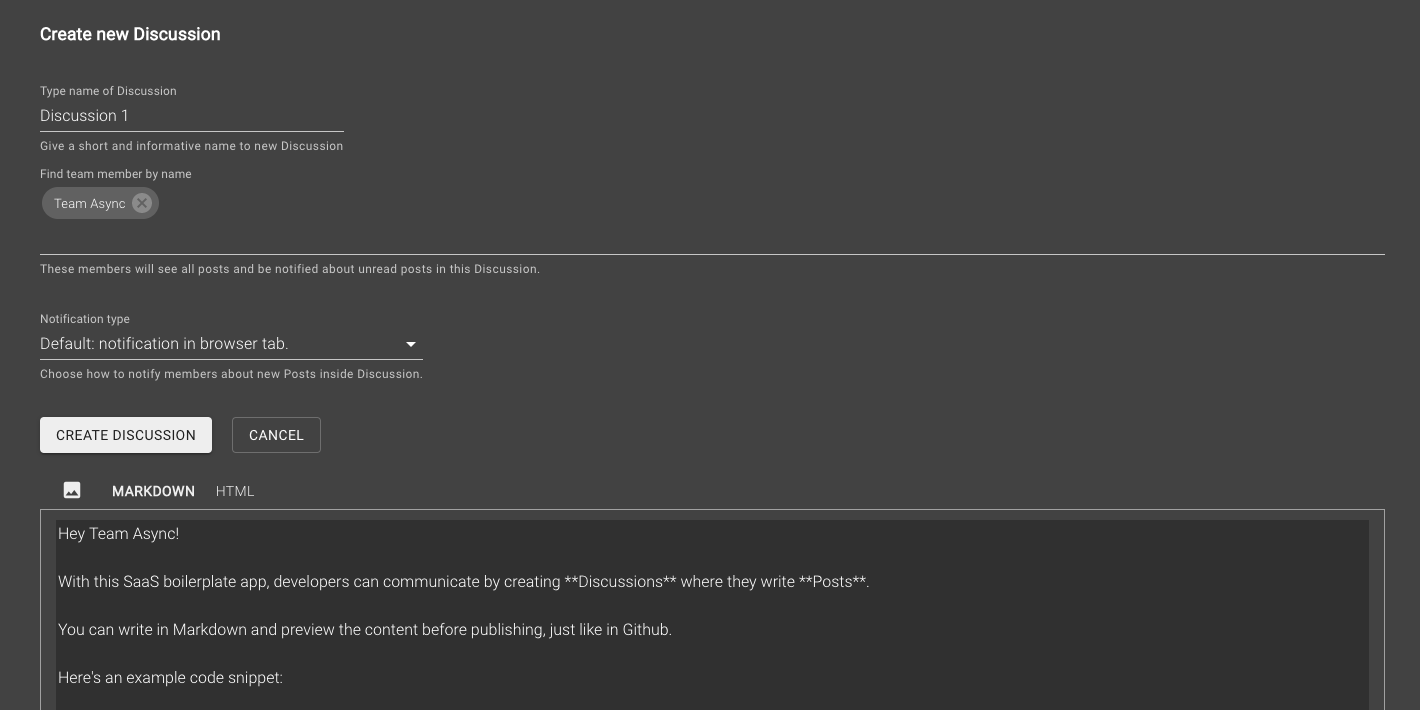Support Ukraine: link
Open source web app that saves you many days of work when building your own SaaS product. The boilerplate comes with many basic SaaS features (see Features below) so that you can focus on features that differentiate your product.
If you want to learn how to build this project from scratch, check out our book: https://builderbook.org/book
The open source project is located in the saas folder. If you purchased our book, codebases for each of the book's chapters are located in the book folder.
We've used this saas project to build:
- Builder Book - learn how to build full-stack web apps from scratch
- SaaS Boilerplate - open source web app to build your own SaaS product
- Work in biotech - job board for biotech startup companies
- AI-cruiter - browser extension is built for recruiters managing a high volume of job applicants. AI-cruiter uses LLMs - like ChatGPT and PaLM 2 - to generate succinct and relevant summaries of your job applicants' resumes
- Async - open source urgent vs non-urgent team communication tool for small teams
- Async Labs - many custom dev projects
Check out projects built with the help of this open source app. Feel free to add your own project by creating a pull request.
- Async: Open source web app for team communication, separate urgent vs. non-urgent conversations.
- workinbiotech.com: Work in biotech, job board for small and young biotech companies
- Retaino by Earl Lee: Save, annotate, review, and share great web content. Receive smart email digests to retain key information.
- Builder Book: Open source web app to publish documentation or books.
- Server-side rendering for fast initial load and SEO.
- User authentication with Google OAuth API and Passwordless, cookie, and session.
- Production-ready Express server with compression, parser, and helmet.
- Transactional emails (
AWS SES): welcome, team invitation, and payment. - Adding email addresses to newsletter lists (
Mailchimp): new users, paying users. - File upload, load, and deletion (
AWS S3) with pre-signed request for: Posts, Team Profile, and User Profile. - Websockets with socket.io v3.
- Team creation, Team Member invitation, and settings for Team and User.
- Opinionated architecture:
- keeping babel and webpack configurations under the hood,
- striving to minimize number of configurations,
withAuthHOC to pass user prop and control user access to pages,- HOC extensions
MyAppandMyDocument - server-side rendering with
Material-UI, - model-specific components in addition to common components.
- Universally-available environmental variables at runtime.
- Custom logger (configure what not to print in production).
- Useful components for any web app:
ActiveLink,Confirm,Notifier,MenuWithLinks, and more. - Analytics with
Google Analytics. - Production-ready, scalable architecture:
app- user-facing web app with Next/Express server, responsible for rendering pages (either client-side or server-side rendered).appsends requests via API methods toapiExpress server.api- server-only code, Express server, responsible for processing requests for internal and external API infrastructures.
- Subscriptions with
Stripe:- subscribe/unsubscribe Team to plan,
- update card information,
- verified Stripe webhook for failed payment for subscription.
- Before running, create a
.envfile inside theapifolder with the environmental variables as shown below. These variables are also listed in.env.example, which you can use as a template to create your own.envfile inside theapifoler.
api/.env:
# Used in api/server/server.ts
MONGO_URL_TEST=
MONGO_URL=
SESSION_NAME=
SESSION_SECRET=
COOKIE_DOMAIN=
# Used in api/server/google.ts
GOOGLE_CLIENTID=
GOOGLE_CLIENTSECRET=
# Used in api/server/aws-s3.ts and api/server/aws-ses.ts
AWS_REGION=
AWS_ACCESSKEYID=
AWS_SECRETACCESSKEY=
# Used in api/server/models/Invitation.ts and api/server/models/User.ts
EMAIL_SUPPORT_FROM_ADDRESS=
# Used in api/server/mailchimp.ts
MAILCHIMP_API_KEY=
MAILCHIMP_REGION=
MAILCHIMP_SAAS_ALL_LIST_ID=
----------
# All env variables above this line are needed for successful user signup
# Used in api/server/stripe.ts
STRIPE_TEST_SECRETKEY=sk_test_xxxxxx
STRIPE_LIVE_SECRETKEY=sk_live_xxxxxx
STRIPE_TEST_PLANID=plan_xxxxxx
STRIPE_LIVE_PLANID=plan_xxxxxx
STRIPE_LIVE_ENDPOINTSECRET=whsec_xxxxxx
# Optionally determine the URL
URL_APP="http://localhost:3000"
URL_API="http://localhost:8000"
PRODUCTION_URL_APP="https://saas-app.async-await.com"
PRODUCTION_URL_API="https://saas-api.async-await.com"
-
Your
.envfile file must have values for therequiredvariables. To use all features and third-party integrations, also add theoptionalvariables. -
IMPORTANT: do not publish your actual values for environmentable variables in
.env.example; this file is public and only meant to show you how your.envshould look. -
IMPORTANT: use your values for
PRODUCTION_URL_APPandPRODUCTION_URL_API. These are values for domain name that you own. -
IMPORTANT: The above environmental variables are available on the server only. You should add your
.envfile to.gitignoreinside theapifolder so that your secret keys are not stored on a remote Github repo. -
To get value for
MONGO_URL_TEST, we recommend you use a free MongoDB at MongoDB Atlas or $15/month MongoDB at Digital Ocean -
Specify your own name and secret keys for Express session: SESSION_NAME and SESSION_SECRET
-
Get
GOOGLE_CLIENTIDandGOOGLE_CLIENTSECRETby following the official OAuth tutorial.
Important: For Google OAuth app, callback URL is: http://localhost:8000/oauth2callback
Important: You have to enable Google+ API in your Google Cloud Platform account. -
Once
.envis created, you can run theapiapp. Navigate to theapifolder, runyarn installto add all packages, then run the command below:yarn dev
-
Navigate to the
appfolder, runyarnto add all packages, then runyarn devand navigate tohttp://localhost:3000:- A
.envfile in theappfolder is not required to run, but you can create one to override the default variables. The environmental variables for.envin theappfolder are shown below. You can also refer.env.examplefor creating your own.envfile in theappfolder.
NEXT_PUBLIC_STRIPE_TEST_PUBLISHABLEKEY="pk_test_xxxxxxxxxxxxxxx" NEXT_PUBLIC_STRIPE_LIVE_PUBLISHABLEKEY="pk_live_xxxxxxxxxxxxxxx" NEXT_PUBLIC_BUCKET_FOR_POSTS= NEXT_PUBLIC_BUCKET_FOR_TEAM_AVATARS= NEXT_PUBLIC_BUCKET_FOR_TEAM_LOGOS= NEXT_PUBLIC_URL_APP="http://localhost:3000" NEXT_PUBLIC_URL_API="http://localhost:8000" NEXT_PUBLIC_PRODUCTION_URL_APP= NEXT_PUBLIC_PRODUCTION_URL_API= NEXT_PUBLIC_API_GATEWAY_ENDPOINT= NEXT_PUBLIC_GA_MEASUREMENT_ID=-
IMPORTANT: do not publish your actual values for environmentable variables in
.env.example; this file is public and only meant to show you how your.envshould look. -
IMPORTANT: use your values for
PRODUCTION_URL_APPandPRODUCTION_URL_API. These are values for domain name that you own. -
To get
NEXT_PUBLIC_GA_MEASUREMENT_ID, set up Google Analytics and follow these instructions to find your tracking ID. -
To get
NEXT_PUBLIC_STRIPE_TEST_PUBLISHABLEKEY, go to your Stripe dashboard, clickDevelopers, then clickAPI keys.
- A
-
For successful file uploading, make sure your buckets have proper CORS configuration. Go to your AWS account, find your bucket, go to
Permissions > CORS configuration, add:
[
{
"AllowedHeaders":[
"*"
],
"AllowedMethods":[
"PUT",
"POST",
"GET",
"HEAD",
"DELETE"
],
"AllowedOrigins":[
"http://localhost:3000",
"https://saas-app.async-await.com"
],
"ExposeHeaders":[
"ETag",
"x-amz-meta-custom-header"
]
}
]
-
Make sure to update allowed origin with your actual values for
NEXT_PUBLIC_URL_APPandNEXT_PUBLIC_PRODUCTION_URL_APP. -
Once
.envis created, you can run theappapp. Navigate to theappfolder, runyarn installto add all packages, then run the command below:yarn dev
In lambda directory we are symlinking api directory. You can run symlink command in lambda folder as mentioned below:
bash symlink ../api
We give detailed instructions inside Chapter 9 and 10 of our SaaS Boilerplate book: https://builderbook.org/book
For more detail, check package.json files in both app and api folders and project's root.
To customize styles, check this guide.
Writing a Post, Markdown vs. HTML view:

Discussion between team members:

Want to support this project? Consider buying our books.
You can contact us at team@async-labs.com.
If you are interested in working with us, check out Async Labs.
All code in this repository is provided under the MIT License.
├── .elasticbeanstalk
│ └── config.yml
├── .github
│ └── FUNDING.yml
├── .vscode
│ ├── extensions.json
│ ├── launch.json
│ └── settings.json
├── api
│ ├── .elasticbeanstalk
│ │ └── config.yml
│ ├── server
│ │ ├── api
│ │ │ ├── index.ts
│ │ │ ├── public.ts
│ │ │ ├── team-leader.ts
│ │ │ └── team-member.ts
│ │ ├── models
│ │ │ ├── Discussion.ts
│ │ │ ├── EmailTemplate.ts
│ │ │ ├── Invitation.ts
│ │ │ ├── Post.ts
│ │ │ ├── Team.ts
│ │ │ └── User.ts
│ │ ├── utils
│ │ │ ├── slugify.ts
│ │ │ └── sum.ts
│ │ ├── aws-s3.ts
│ │ ├── aws-ses.ts
│ │ ├── google-auth.ts
│ │ ├── logger.ts
│ │ ├── mailchimp.ts
│ │ ├── passwordless-auth.ts
│ │ ├── passwordless-token-mongostore.ts
│ │ ├── server.ts
│ │ ├── sockets.ts
│ │ └── stripe.ts
│ ├── static
│ │ └── robots.txt
│ ├── test/server/utils
│ │ ├── slugify.test.ts
│ │ └── sum.test.ts
│ ├── .eslintignore
│ ├── .eslintrc.js
│ ├── .gitignore
│ ├── package.json
│ ├── tsconfig.json
│ ├── tsconfig.server.json
│ └── yarn.lock
├── app
│ ├── .elasticbeanstalk
│ │ └── config.yml
│ ├── components
│ │ ├── common
│ │ │ ├── Confirmer.tsx
│ │ │ ├── LoginButton.tsx
│ │ │ ├── MemberChooser.tsx
│ │ │ ├── MenuWithLinks.tsx
│ │ │ ├── MenuWithMenuItems.tsx
│ │ │ └── Notifier.tsx
│ │ ├── discussions
│ │ │ ├── CreateDiscussionForm.tsx
│ │ │ ├── DiscussionActionMenu.tsx
│ │ │ ├── DiscussionList.tsx
│ │ │ ├── DiscussionListItem.tsx
│ │ │ └── EditDiscussionForm.tsx
│ │ ├── layout
│ │ │ ├── index.tsx
│ │ ├── posts
│ │ │ ├── PostContent.tsx
│ │ │ ├── PostDetail.tsx
│ │ │ ├── PostEditor.tsx
│ │ │ └── PostForm.tsx
│ │ ├── teams
│ │ │ └── InviteMember.tsx
│ ├── lib
│ │ ├── api
│ │ │ ├── makeQueryString.ts
│ │ │ ├── public.ts
│ │ │ ├── sendRequestAndGetResponse.ts
│ │ │ ├── team-leader.ts
│ │ │ └── team-member.ts
│ │ ├── store
│ │ │ ├── discussion.ts
│ │ │ ├── index.ts
│ │ │ ├── invitation.ts
│ │ │ ├── post.ts
│ │ │ ├── team.ts
│ │ │ └── user.ts
│ │ ├── confirm.ts
│ │ ├── isMobile.ts
│ │ ├── notify.ts
│ │ ├── resizeImage.ts
│ │ ├── sharedStyles.ts
│ │ ├── theme.ts
│ │ └── withAuth.tsx
│ ├── pages
│ │ ├── _app.tsx
│ │ ├── _document.tsx
│ │ ├── billing.tsx
│ │ ├── create-team.tsx
│ │ ├── discussion.tsx
│ │ ├── invitation.tsx
│ │ ├── login-cached.tsx
│ │ ├── login.tsx
│ │ ├── team-settings.tsx
│ │ └── your-settings.tsx
│ ├── public
│ │ └── pepe.jpg
│ ├── server
│ │ ├── robots.txt
│ │ ├── routesWithCache.ts
│ │ ├── server.ts
│ │ └── setupSitemapAndRobots.ts
│ ├── .babelrc
│ ├── .eslintignore
│ ├── .eslintrc.js
│ ├── .gitignore
│ ├── next.env.d.ts
│ ├── next.config.js
│ ├── package.json
│ ├── tsconfig.json
│ ├── tsconfig.server.json
│ └── yarn.lock
├── book
├── lambda
│ ├── .estlintignore
│ ├── .eslintrc.js
│ ├── .gitignore
│ ├── api
│ ├── handler.ts
│ ├── package.json
│ ├── serverless.yml
│ ├── tsconfig.json
│ └── yarn.lock
├── .gitignore
├── LICENSE.md
├── README.md
├── package.json
├── yarn.lock











